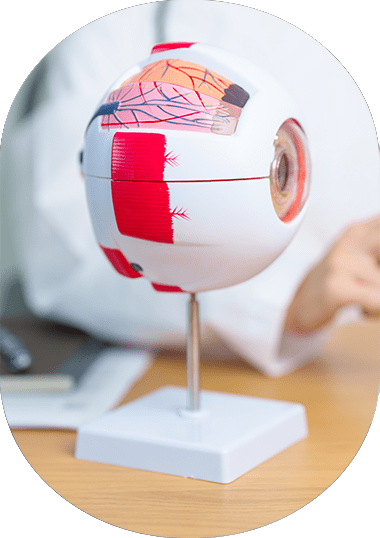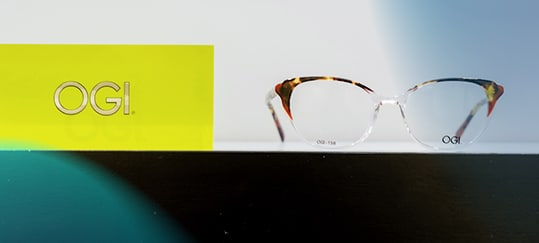Monitoring Your Eye Health
Eye disease can be challenging to deal with and comes in different forms, such as cataracts, glaucoma, diabetic eye disease, and age-related macular degeneration (AMD). We offer a full-scope eye disease diagnosis and management experience with pre and post-op care for cataracts, glaucoma management, and more.
Our team uses innovative technology such as digital retinal imaging, optical coherence tomography (OCT), and visual field testing to capture the details of your eyes and vision.
Contact us to schedule an appointment today and see how we can help you navigate eye disease with a customized treatment plan.
Request Appointment

Consistent Eye Exams are Key
Consistent eye exams are essential for several reasons beyond updating your prescription. Regular eye exams help us check for early eye disease signs. The sooner we can examine your eyes for any issues, the sooner we can formulate a personalized treatment plan.
Timely eye exams, innovative technology, and personalized care are a part of our eye disease philosophy at Waterloo Vision Care Clinic.
Understanding Eye Disease
At Waterloo Vision Care Clinic, we believe in education and helping our patients understand the different forms of eye disease. We know any issues with your eyes or vision can be overwhelming, but you can rest easy knowing we’re in your corner.
Familiarizing our patients with some of the early signs of eye diseases like glaucoma and cataracts can help them know when to visit us for a comprehensive eye exam.
Glaucoma Management
Our glaucoma management services include OCT and visual field testing to detect and diagnose issues in your vision.
Glaucoma is a group of eye conditions that cause damage to the optic nerve, which is responsible for sending visual information to your brain. Damage to the optic nerve can lead to vision loss and blindness if not detected and treated early.
Damage from glaucoma can be caused by high pressure in the eye, known as intraocular pressure. Risk factors for glaucoma can include:
- Age
- Family history
- Previous eye injuries
Maintaining a regular eye exam schedule is key to monitoring changes in your vision due to glaucoma.
Pre & Post-Op Cataract Care
We offer pre-cataract surgery evaluation and post-op care. Our cataract evaluations include digital retinal imaging, and we can help match you with a cataract specialist when needed.
Cataracts develop when the normally clear eye lens becomes clouded and can include symptoms like blurry vision, dim or yellowed vision, and difficulty seeing at night. Cataracts begin forming when proteins in the eye form clumps that prevent the lens from sending clear images to the retina, the thin layer of tissue that lines the back of the eye.
If cataracts progress to a later stage and prevent you from going about your daily activities, such as reading or driving, cataract surgery is the effective option to remove them.
Diabetic Eye Disease Evaluations
Diabetes can increase the risk of developing eye diseases such as glaucoma, cataracts, and diabetic retinopathy, the primary vision loss concern for patients with diabetes.
Some signs and symptoms of diabetic retinopathy can include:
- Loss of central vision
- Blurry vision
- Inability to see colours
- Black spots or holes in your vision
We offer diabetic eye disease evaluations that include digital retinal imaging, OCT, and visual field testing to keep track of the effect diabetes is having on your vision.
Age-Related Macular Degeneration (AMD)
AMD is a progressive disease affecting your central vision, damaging the macula. This damage can make things like reading and driving much more difficult. AMD is a leading cause of vision loss among older adults with 2 main forms:
- Dry AMD is the more common form of the disease and occurs in early, intermediate, and late stages. This form of AMD occurs when the macula thins with age.
- Wet AMD is the less common form of the disease and causes faster and more severe vision loss. Wet AMD occurs when abnormal blood vessels grow in the back of the eye and damage the macula.
We can diagnose and monitor AMD with OCT scans and visual field testing to get a more detailed look at how it affects your vision. Consistent eye exams, adjusting your diet, and giving up smoking are also effective prevention methods for AMD.
We also offer Vita Risk genetic testing to help identify people who may have higher risk of developing wet AMD after exposure to zinc.
Explore Our Technology
Knowing the different forms of eye disease is a great first step, but we also have the technology to make a difference.
Our diagnostic technology includes OCT, digital retinal imaging, and visual field testing to help our team detect signs of eye disease early and move quickly to help preserve your vision.
Optical Coherence Tomography
Optical coherence tomography (OCT) is a noninvasive imaging technology that produces a highly detailed 3D image of the inside of your eye. Using OCT, our team can quickly and easily assess the health of your retina and optic nerve, identify potential issues, and provide you with personalized treatment options.
OCT allows us to see the layers of your retina to map and measure their thickness. These measurements can help us diagnose and manage eye diseases like glaucoma, age-related macular degeneration, and diabetic eye disease.
Digital Retinal Imaging
Digital retinal imaging allows our team to take quick, noninvasive, detailed images of your eye. These high-resolution images allow us to examine hard-to-see details and check for signs of eye diseases like glaucoma, diabetic retinopathy, macular degeneration, and more.
Retinal imaging can help us capture the details of your eyes when you visit us for a comprehensive eye exam.
Visual Field Testing
Visual field testing is a noninvasive test that measures the full horizontal and vertical range of what you can see peripherally, helping our team detect potential blind spots that could indicate eye health issues.
Visual field testing is efficient and crucial for the early detection and monitoring of eye diseases like glaucoma and macular degeneration. This type of testing can provide a clear map of your visual field, which can be helpful for our team when assessing your treatment options.
Vita-Risk Testing for AMD
Vita Risk is a genetic test that helps identify those who may have a higher risk of developing wet AMD after exposure to zinc. This information helps our team:
- Tailor your AMD treatment plan: Knowing more about your individual risk helps us recommend a more personalized treatment strategy, potentially including adjustments to dietary zinc intake and additional monitoring.
- Implement proactive AMD management: Early detection and intervention can be crucial for managing AMD effectively. Vita Risk testing can help us identify those who may benefit from more frequent monitoring or preventive measures.
Striving for Healthy Eyes & Vision
Our eye disease diagnosis and management services are designed to help capture all the details of your eyes and vision. We aim to review the complete picture of your eye health before determining what treatment and management options to recommend.
Contact us to schedule your appointment today and get an early start on eye disease management.
Request AppointmentCome Visit Us
Visit Us
We are located in Medical Centre 1 (at The Boardwalk), with plenty of free parking available in front and at the rear of the building.
(Do not send personal health information by email)
Our Address
- 430 The Boardwalk, Suite 404 Medical Centre 1
- Waterloo, ON N2T 0C1
Contact Information
- Phone: 519-885-2701
- Email: [email protected]
Our Hours
- Monday: 8:30 AM – 7:00 PM
- Tuesday: 8:30 AM – 5:00 PM
- Wednesday: 8:30 AM – 7:00 PM
- Thursday: 8:30 AM – 7:00 PM
- Friday: 8:30 AM – 4:00 PM
- Saturday: Closed
- Sunday: Closed
Our Services
Our Brands



Add bottom right image















